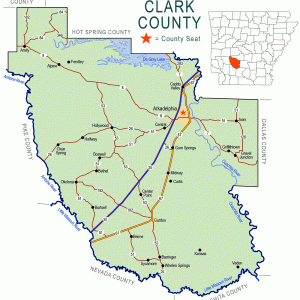calsfoundation@cals.org
Keyton (Clark County)
Keyton is an unincorporated community in Clark County, located about four miles northwest of Gurdon (Clark County). The community is about one mile west of Center Point (Clark County) and is directly east of Interstate 30.
The first major landowner in the area was Randolph Lewis. He obtained 640 acres on December 1, 1838, including the entire section where Keyton is located. Other landowners gradually moved to the area, but development was slow to reach the future location of Keyton.
This changed in the 1880s when the land was purchased by Robert Benjamin Franklin (R. B. F.) Key, from whom the community derived its name. Key was born in Georgia in 1848 and moved to Arkansas with his family about a year later, settling in Dallas County before moving to Clark County in the 1850s.
His father worked as a doctor and a farmer. Key grew up in Clark County, working on his father’s farm. While working on South Fork Creek, he learned how to operate a water-powered sawmill. He married Louisa Clark, known as Lou, in 1870, and the couple purchased eighty acres of land near Okolona (Clark County). Key farmed the land and soon added a number of enterprises to his holdings, including a sawmill, grist mill, and cotton gin. In the early 1880s, he sold the land near Okolona and purchased a mill located on the railroad south of Gurdon. Lou died in 1885, and Key married her sister Ella the same year. Lou and R. B. F. Key had nine children, five of whom lived to adulthood, while Ella and R. B. F. Key had an additional five.
After his marriage to Ella, Key purchased land northwest of Gurdon and established another sawmill. Key operated another mill at Delight (Pike County) in 1907. The same year, he made a donation for the construction of a building for Henderson-Brown College in Arkadelphia (Clark County). Named for Key, it was only the second permanent structure on the campus and housed music facilities and apartments for faculty members. It continued to be used by Henderson State Teachers College until 1964, when it was razed.
Key served as the director and vice president of Elkhorn Bank in Arkadelphia and as a member of the city councils in both Gurdon and Arkadelphia. He moved to Lakeland, Florida, with his family in 1918, dying there in 1931.
When Key founded the sawmill at Keyton, many of the workers at his mill in Gurdon moved with him to the new site. With the establishment of the mill, a community suddenly emerged. When Key moved the mill to Delight, many of the workers remained behind in Keyton. With the major industry no longer active, most turned to farming and other livelihoods. It is unclear if another mill operated in the area after the closure of Key’s operation.
The Keyton Post Office opened in 1891 and closed in 1914. Key served as the first postmaster. The area later began being served by the Gurdon Post Office. Little information exists about other entities in the community, including schools and stores. Evidence suggests that a store did operate in the community while the sawmill was in operation but likely closed when it moved to Delight or when the post office closed. Children from the nearby community of Center Point attended school at South Fork (Clark County), and it is likely that students from Keyton did as well. South Fork was later separated from Keyton by Interstate 30.
Keyton remains rural and undeveloped. The area is heavily forested, and timber continues to be the largest economic activity in Keyton. The community consists of several homes. No businesses or churches are located in the community in the twenty-first century, and most residents commute to Gurdon or Arkadelphia for employment.
For additional information:
Newberry, Farrar. Through the Eyes of Farrar Newberry. Arkadelphia, AR: Clark County Historical Association, 2002.
Richter, Wendy, et al. Clark County Arkansas: Past and Present. Arkadelphia, AR: Clark County Historical Association, 1992.
David Sesser
Southeastern Louisiana University
 Clark County Map
Clark County Map 



Comments
No comments on this entry yet.